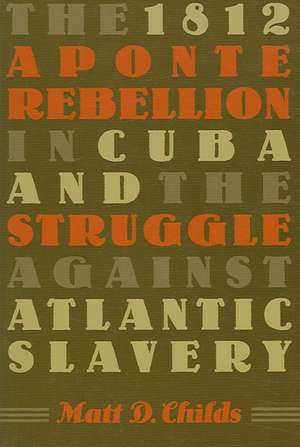The 1812 Aponte Rebellion in Cuba and the Struggle Against Atlantic Slavery: The Politics of Pluralism in Multireligious America: Envisioning Cuba (Paperback)
Autor Matthew D. Childsen Limba Engleză Paperback – 26 noi 2006
Childs explains how slaves and free people of color responded to the nineteenth-century "sugar boom" in the Spanish colony by planning a rebellion against racial slavery and plantation agriculture. Striking alliances among free people of color and slaves, blacks and mulattoes, Africans and Creoles, and rural and urban populations, rebels were prompted to act by a widespread belief in rumors promising that emancipation was near. Taking further inspiration from the 1791 Haitian Revolution, rebels sought to destroy slavery in Cuba and perhaps even end Spanish rule. By comparing his findings to studies of slave insurrections in Brazil, Haiti, the British Caribbean, and the United States, Childs places the rebellion within the wider story of Atlantic World revolution and political change. The book also features a biographical table, constructed by Childs, of the more than 350 people investigated for their involvement in the rebellion, 34 of whom were executed.
Din seria Envisioning Cuba (Paperback)
-
 Preț: 266.35 lei
Preț: 266.35 lei -
 Preț: 305.18 lei
Preț: 305.18 lei -
 Preț: 307.50 lei
Preț: 307.50 lei -
 Preț: 263.08 lei
Preț: 263.08 lei -
 Preț: 331.85 lei
Preț: 331.85 lei -
 Preț: 303.66 lei
Preț: 303.66 lei -
 Preț: 349.55 lei
Preț: 349.55 lei -
 Preț: 373.87 lei
Preț: 373.87 lei -
 Preț: 303.05 lei
Preț: 303.05 lei -
 Preț: 304.04 lei
Preț: 304.04 lei -
 Preț: 309.26 lei
Preț: 309.26 lei -
 Preț: 272.12 lei
Preț: 272.12 lei -
 Preț: 266.94 lei
Preț: 266.94 lei -
 Preț: 306.16 lei
Preț: 306.16 lei -
 Preț: 271.19 lei
Preț: 271.19 lei -
 Preț: 308.27 lei
Preț: 308.27 lei -
 Preț: 265.42 lei
Preț: 265.42 lei -
 Preț: 289.37 lei
Preț: 289.37 lei -
 Preț: 332.94 lei
Preț: 332.94 lei -
 Preț: 286.47 lei
Preț: 286.47 lei -
 Preț: 285.50 lei
Preț: 285.50 lei -
 Preț: 286.26 lei
Preț: 286.26 lei -
 Preț: 339.57 lei
Preț: 339.57 lei -
 Preț: 269.24 lei
Preț: 269.24 lei -
 Preț: 284.94 lei
Preț: 284.94 lei -
 Preț: 271.57 lei
Preț: 271.57 lei
Preț: 269.06 lei
Nou
Puncte Express: 404
Preț estimativ în valută:
51.48€ • 53.91$ • 42.70£
51.48€ • 53.91$ • 42.70£
Carte tipărită la comandă
Livrare economică 09-23 aprilie
Preluare comenzi: 021 569.72.76
Specificații
ISBN-13: 9780807857724
ISBN-10: 0807857726
Pagini: 300
Dimensiuni: 163 x 236 x 20 mm
Greutate: 0.47 kg
Editura: University of North Carolina Press
Seria Envisioning Cuba (Paperback)
ISBN-10: 0807857726
Pagini: 300
Dimensiuni: 163 x 236 x 20 mm
Greutate: 0.47 kg
Editura: University of North Carolina Press
Seria Envisioning Cuba (Paperback)
Textul de pe ultima copertă
In 1812 a series of revolts known collectively as the Aponte Rebellion erupted across the island of Cuba, comprising one of the largest and most important slave insurrections in Caribbean history. Childs provides the first in-depth analysis of the rebellion, situating it in local, colonial, imperial, and Atlantic World contexts. He explains how slaves and free people of color responded to the 19th-century "sugar boom" in the Spanish colony by planning a rebellion against racial slavery and plantation agriculture. Striking alliances among free people of color and slaves, blacks and mulattoes, Africans and Creoles, and rural and urban populations, rebels were prompted to act by a widespread belief in rumors promising that emancipation was near. Taking further inspiration from the 1791 Haitian Revolution, rebels sought to destroy slavery in Cuba and perhaps even end Spanish rule. In 1812 a series of revolts known collectively as the Aponte Rebellion erupted across the island of Cuba, comprising one of the largest and most important slave insurrections in Caribbean history. Childs provides the first in-depth analysis of the rebellion, situating it in local, colonial, imperial, and Atlantic World contexts. He explains how slaves and free people of color responded to the 19th-century "sugar boom" in the Spanish colony by planning a rebellion against racial slavery and plantation agriculture. Striking alliances among free people of color and slaves, blacks and mulattoes, Africans and Creoles, and rural and urban populations, rebels were prompted to act by a widespread belief in rumors promising that emancipation was near. Taking further inspiration from the 1791 Haitian Revolution, rebels sought to destroy slavery in Cuba and perhaps even end Spanish rule.
Notă biografică
Matt D. Childs is assistant professor of Caribbean history at Florida State University and coeditor of The Yoruba Diaspora in the Atlantic World.













